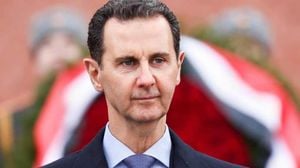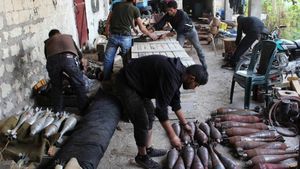Following the recent change of leadership in Syria, the European Union (EU) has confirmed it will not ease sanctions against the country until significant guarantees are provided by the new rulers. On December 16, 2024, Kaja Kallas, the EU's foreign policy chief, articulated the position during discussions with fellow ministers, highlighting the importance of protecting minority rights and ensuring women's rights are upheld as pivotal issues.
The sanctions are tied to the EU's demand for the new Syrian leadership—currently formed by the opposition group known as Hayat Tahrir al-Sham (HTS)—to navigate through various commitments for future governance. Kallas reinforced, "This is clearly not the question of today, but rather of the future." This sentiment captures the EU's cautious approach, underscoring their directive to prioritize long-term stability over immediate relations.
Kallas expressed during her appearance at the EU foreign ministers' meeting: "Our top diplomat in Syria will go to Damascus today. We'll have the contacts there, and we are also going to discuss with the foreign ministers on what level of engagement and how we proceed from here." These remarks signal the EU's intent to direct diplomatic efforts toward fostering reliable communications with the new regime.
Since the sudden exit of Bashar al-Assad on December 8, the transition has surprisingly unfolded without widespread chaos, leading to speculation about the future political framework of Syria. With HTS at the helm until planned elections are held, Arab leaders are advocating for UN-supervised elections, seeking to shape political legitimacy moving forward.
Significant levels of apprehension remain, particularly about ties to foreign powers such as Russia and Iran. Kallas stated, "Russia and Iran are not your friends, (and) are not helping you if you are in trouble," encouraging the new Syrian leadership to break free from what she describes as detrimental alliances.
Syria finds itself at a crossroad faced with immense socio-economic challenges, including rampant poverty and high unemployment rates stemming from years of civil conflict under Assad's rule. Meanwhile, Kallas and her colleagues from various EU nations have established clear conditions for future cooperation, emphasizing respect for human rights, with Spanish Foreign Minister Jose Manuel Albares adding, "We must make sure there (is) no foreign interference.”
Likewise, French Foreign Minister Jean-Noël Barrot echoed this sentiment, asserting the necessity for political transitions reflective of all Syrian minority groups, with safeguards against extremist ideologies. The urgency surrounding these conditions correlates with the European bloc's hesitance to express full support or relief until political integrity returns to the governance framework.
Syria is still grappling with the repercussions of decades under Assad's leadership. The minimal violence reported during the transitional phase stands as a rare occurrence, yet the expectations from the EU remain high. It is evident they are prioritizing the populace’s long-term welfare over hasty financial incentives or relief.
Many EU countries are also resuming dialogues on managing asylum statuses for Syrians. While negotiations surrounding the return of displaced citizens are being cautiously tread, hundreds of thousands remain within the EU seeking stability and safety.
The EU’s response is characterized by cautious optimism—both for Syria's future and for its own political engagement. The strategies being implemented focus on maintaining humanitarian support targeted at those still displaced within the region, countering urges to resume normal relations devoid of contextual reforms.
"Syria faces an optimistic, positive, but rather uncertain future, and we have to make sure this goes to the right direction," Kallas concluded, illustrating the EU's dual nature of readiness to engage yet firmly believing conditional diplomacy is necessary to safeguard both vulnerable populations and broader regional stability.



